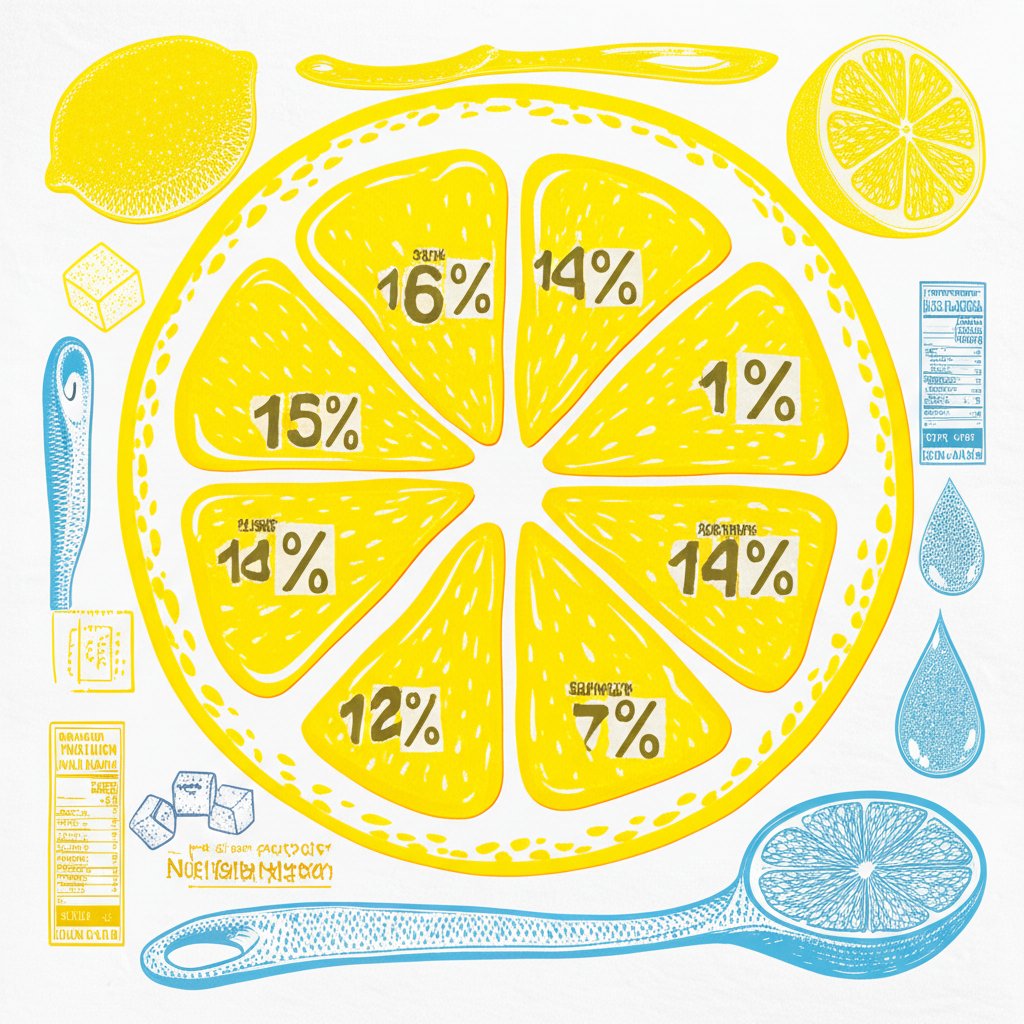That thirst-quenching glass of lemonade on a hot day? It hits the spot, but understanding lemonade nutrition facts is key to making informed choices about your hydration and sugar intake. From homemade versions to store-bought brands, the nutritional profile can vary dramatically.
At a glance:
- You’ll learn how sugar content impacts lemonade’s overall nutritional value.
- We’ll explore the differences between homemade, store-bought, and sugar-free options.
- You’ll discover healthier ways to enjoy lemonade without compromising on taste.
- We’ll provide a quick guide to help you decipher lemonade labels.
- You’ll understand the potential impact of lemonade on your daily sugar intake.
The Sweet Truth: Sugar Content in Lemonade
The biggest factor influencing lemonade nutrition facts is its sugar content. Most commercially available lemonades are loaded with added sugars, primarily high fructose corn syrup or sucrose. A single serving (8 ounces) can easily contain over 25 grams of sugar, exceeding the American Heart Association’s daily recommended limit for women (25 grams) and nearing it for men (36 grams).
This high sugar content contributes significantly to the calorie count and offers little nutritional benefit beyond quick energy. Regularly consuming sugary drinks like lemonade can contribute to weight gain, increase the risk of type 2 diabetes, and negatively impact dental health.
Example: Consider a popular brand of lemonade that boasts a “classic” flavor. A 12-ounce can contains approximately 40 grams of sugar and 150 calories. This highlights how quickly calories and sugar can add up.
Homemade vs. Store-Bought: A Nutritional Showdown
One of the easiest ways to control lemonade nutrition facts is by making it yourself. Here’s a quick comparison:
| Feature | Store-Bought Lemonade | Homemade Lemonade |
|---|---|---|
| Sugar Content | Typically high, often with HFCS | Controllable; use natural sweeteners |
| Ingredients | Artificial flavors, preservatives | Fresh lemons, water, optional sweetener |
| Nutritional Value | Minimal vitamins/minerals, empty calories | Vitamin C from lemons, fewer additives |
| Cost | Varies by brand | Can be more cost-effective in bulk |
| Homemade lemonade allows you to opt for natural sweeteners like honey, maple syrup, or stevia, and adjust the sweetness to your preference. You also avoid artificial flavors, colors, and preservatives found in many store-bought versions. |
Is Sugar-Free Lemonade a Healthy Alternative?
Sugar-free lemonade might seem like the perfect solution, but it’s essential to consider the trade-offs. These options typically use artificial sweeteners like aspartame, sucralose, or stevia to achieve a sweet taste without the calories.
While these artificial sweeteners are generally considered safe in moderation, some individuals may experience side effects like headaches or digestive issues. Furthermore, some studies suggest that artificial sweeteners can still impact blood sugar levels and gut health, although the evidence is mixed.
Action Item: Read the ingredient label carefully to identify the specific sweetener used and consider any potential sensitivities you may have.
Decoding Lemonade Labels: What to Look For
Navigating lemonade nutrition facts labels can be tricky. Here’s what to prioritize:
- Serving Size: Pay attention to the serving size listed, as the nutritional information is based on this amount.
- Total Sugars: This includes both naturally occurring sugars and added sugars. Aim for lower numbers.
- Added Sugars: This indicates the amount of sugar added during processing. High added sugar intake is linked to various health problems.
- Ingredients List: Look for natural ingredients like lemon juice, water, and natural sweeteners. Be wary of artificial flavors, colors, and preservatives.
- Vitamin C: Lemonade can be a good source of Vitamin C, an important antioxidant.
A quick note on Jell-O: Speaking of refreshing treats, did you know that Jell-O also comes in lemon flavor? While both offer a sweet taste, their nutritional profiles differ significantly. Learning about Jello’s nutritional value revealed can help you make more rounded snack choices.
Lemonade Nutrition Facts: A Deeper Dive (per 8-ounce serving)
| Category | Regular Lemonade (Store-Bought) | Homemade Lemonade (Honey) | Sugar-Free Lemonade (Aspartame) |
|---|---|---|---|
| Calories | 100-120 | 60-80 | 5-10 |
| Total Sugars (g) | 25-30 | 15-20 | 0 |
| Vitamin C (% DV) | 0-2% | 10-15% | 0-2% |
| Sodium (mg) | 10-20 | 5-10 | 5-10 |
| *DV = Daily Value | |||
| These are approximate values and can vary depending on the specific recipe or brand. |
Healthier Ways to Enjoy Lemonade
Love the taste of lemonade but want to reduce the sugar content? Here are a few smart swaps:
- Dilute it: Mix lemonade with water or sparkling water to reduce the concentration of sugar and calories.
- Use natural sweeteners: Experiment with honey, maple syrup, monk fruit sweetener, or stevia instead of refined sugar.
- Add fruit: Infuse your lemonade with fresh fruits like berries, cucumber, or mint for natural sweetness and flavor.
- Make it unsweetened: Embrace the tartness of lemons and skip the sweetener altogether. You might be surprised at how refreshing it can be.
- Adjust your Recipe: Instead of 1 cup of sugar per 8 cups of water, reduce it to 1/2 cup and adjust to your taste.
- Limit Portion Sizes: Use smaller glasses, and drink mindfully.
Case Snippet: Sarah, a self-confessed lemonade addict, decided to switch to homemade lemonade using honey. She gradually reduced the amount of honey over a few weeks, eventually finding a balance that satisfied her sweet tooth without excessive sugar.
Quick Answers About Lemonade Nutrition Facts:
Q: Is lemonade a good source of vitamins and minerals?
A: Lemonade offers a small amount of Vitamin C from lemons, but it’s not a significant source of other essential nutrients. The high sugar content often outweighs any potential benefits.
Q: Can lemonade help with hydration?
A: While lemonade provides fluid, the high sugar content can actually have a dehydrating effect. Water or unsweetened beverages are better choices for optimal hydration.
Q: Does lemonade have any health benefits?
A: The primary benefit of lemonade lies in its Vitamin C content, which supports immune function. However, this benefit is often overshadowed by the negative effects of high sugar intake.
Q: Is lemonade safe for diabetics?
A: Traditional lemonade is generally not recommended for individuals with diabetes due to its high sugar content. Sugar-free options may be suitable, but it’s important to monitor blood sugar levels and consult with a healthcare professional.
Q: Can I make a big batch of Lemonade and store it?
A: Yes, but without preservatives, the lemonade will only last up to 7 days in the refrigerator.
Your Lemonade Playbook: A Step-by-Step Guide
Ready to take control of your lemonade consumption? Follow these steps:
- Assess your current intake: Track how much lemonade you drink and the sugar content of your preferred brand.
- Set realistic goals: Gradually reduce your lemonade intake or switch to healthier alternatives.
- Experiment with recipes: Try different homemade lemonade recipes with natural sweeteners and fruit infusions.
- Read labels carefully: Compare nutrition facts labels and choose options with lower sugar content.
- Listen to your body: Pay attention to how you feel after drinking lemonade and adjust your consumption accordingly.
- Stay Hydrated: Drink plenty of water.
Take Action Today
Understanding lemonade nutrition facts empowers you to make healthier choices. By opting for homemade versions, using natural sweeteners, and being mindful of portion sizes, you can enjoy the refreshing taste of lemonade without compromising your health. So, grab those lemons, get creative in the kitchen, and sip your way to a healthier, happier you.

- Glass Storage Containers With Glass Lids That Lock for Freshness - February 2, 2026
- Locking Glass Food Storage Containers for Organized and Fresh Meals - February 1, 2026
- Borosilicate Glass Food Storage for Freshness and Organization - January 31, 2026










